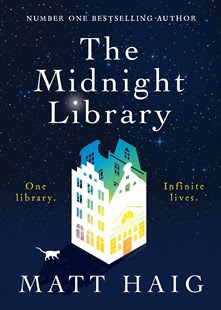The Midnight Library
The Midnight Library is Borges-Lite. Think ‘The Library of Babel’ as a novel for twenty-somethings. A confused young woman – attempting suicide – ends up in a library as a half-way house between here and there. On the shelves are an infinite number of variations of the life she has to this point led, and she has a chance to try them all. Until the shoe fits. (The shoe, however, gets tighter and death – real death – is a distinct possibility).
Nora Seed has gone to seed – she has walked away from a
musical dream and let her brother down in the process; she lives alone after dumping her fiancé; she's a depressive employee of a music shop where moping
puts off customers. There’s not much worth living for, she thinks. Once in the
library (having taken the red pill or the blue pill, or both) she
comes across the manifestation of the kind librarian who looked after her the
day her mother died, while still at school. Kindness is returned in the temporary after life.
What would you change, if you could live your life again? Matt Haig
takes us first through the obvious choices: the partner Nora dumped (what if she’d
stayed?), the careers she might have followed (the rock star, the environmental
scientist), the talents she’d nurtured or not (a swimming star whose fame leads
to the motivation circuit, or the musician whose songs touch everyone). Then,
as the story progresses and the variations of her life play out like little
amusements, deeper questions about hurts nurtured or forgiven,
and acceptance of self rather than this constant pain of regret, come to the fore.
There’s something like a diary entry towards the end of the
book, which may – quoted like this – sound trite. It’s Borges Lite, as said,
but it’s also very relatable, even to
a reader probably on the wrong end of the demographic towards which the book is
clearly and cleverly crafted. Let’s end with Nora’s thoughts, thus expressed:
It is easy to mourn the lives we aren’t living. Easy to wish
we’d developed other talents said yes to different offers. Easy to wish we’d
worked harder, loved better, handled our finances more astutely, been more
popular, stayed in the band, gone to Australia [yes, we made the list] said yes
to coffee or done more bloody yoga … But it is not the lives we regret not
living that are the real problem. It is the regret itself. It’s the regret that
makes us shrivel and wither and feel like our own and other people’s worst
enemy (277).
It’s good to read books that can’t easily be made into films
– at least not without hacking into the variations and simplifying the
repetitions until the narrative flows. Given that the narrative keeps changing, this book could very easily have been
shallow and episodic, but it does play
out the little chapters like variations on a moving melody. I enjoyed it, and it did make me think. Whether I am thinking this in my
own life, or a variation of my life in a multiverse is where Borges needs to
step back in. But that, fittingly, would be another book, in a different library.




Comments
Post a Comment